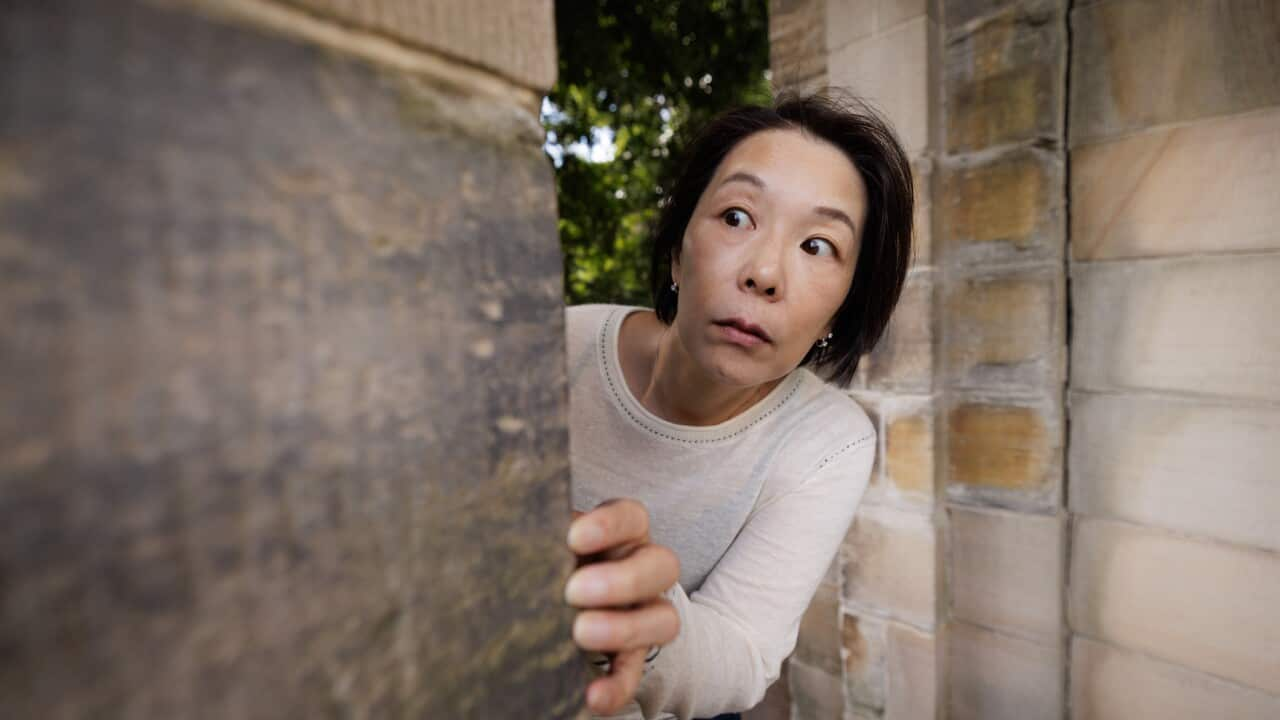This lesson suits intermediate learners. After listening, scroll down and test your knowledge with our quiz.
Learning notes
Language objective
How to talk about crime events and stories
Different phrases to use when talking about criminal activities:
- Have you ever witnessed a crime?
- I had a close call once.
- I don’t like it when guilty people get off scot-free.
- I don’t like it when people get away with murder.
- They have a way of bending the rules.
- Someone was cooking the books.
- It’s an open and shut case.
Different phrases to use when talking about watching, reading, or listening to crime stories:
- I’m a total crime buff!
- I love to binge on intriguing true crime stories.
- I like it when they solve a mystery that has everyone racking their brains.
- I love connecting the dots.
- I like it when strategic thinking pays off in the end.
- The case is puzzling, complex, and lacks clear evidence.
Vocabulary & Colloquial expressions
If something lets you down, it’s disappointing.
To get off scot-free means to completely avoid punishment.
A close call is when someone narrowly avoids something negative. It’s when you only just manage to avoid a very bad outcome.
To cook the books is to be dishonest and falsely report financial information.
If a crime has everyone racking their brains, it’s extremely difficult to solve.
If you fess up to something, you admit that you have done something wrong.
A white-collar crime is a non-violent financial or other professional crime.
To witness something means to see or observe something.
To sing means to confess or to inform on someone or something.
To spill the beans means to talk about something.
Fraudulent activities are dishonest and deceptive actions someone does in order to mislead others for personal gain or profit.
An open and shut case is a case in which all facts are clear and obvious.
A moral dilemma is a situation in which a person faces a difficult choice when all options are morally complicated.
Dodgy is an informal word for dishonest.
Transcript:
(Note: This is not a word-for-word transcript)
SBS acknowledges the Traditional Custodians of Country and their connections and continuous care for the skies, lands and waterways throughout Australia.
My name is Josipa, and I need to come clean about something. That is, I need to confess, admit the truth about something that I’ve been keeping secret.
Ok, here it is, I hope you won’t judge me but I’m a total crime buff, that is, I absolutely love anything to do with crime fiction! I devour crime shows, podcasts, and books like a detective on a mission.
One interesting thing about true crime is how it attracts our attention with its dark and disturbing nature. How can we experience pleasure while watching something dreadful? And why are we so curious about it?
Picture this: I’m in my living room surrounded by evidence boards, photographs, and case files, determined to solve a mystery. It’s like a thrilling puzzle that I can’t resist.
The suspense, the hunt for hidden clues, putting together timelines, identifying suspects – it’s an adrenaline rush that keeps me hooked.
And I wonder are there really human bodies buried inside the Sydney Harbour Bridge?
Emily
There were some gruesome decapitations, some falls from the top of the bridge, some loss of limbs, etc. But the story goes, that there were three unreported deaths.
Josipa
That was Emily, our true crime expert, who's going to spill the beans on Sydney's grim past. That is, she’ll talk about a dark and tough time in Sydney's history later in the show.
Now, let’s turn this episode into an exciting investigation. We’ll uncover secret vocabulary, engage in thrilling – exciting - dialogues, and analyse thought-provoking crime scenarios.
Thought-provoking, that’s another useful word when talking about true crime, it means something that makes you think deeply.
Anyway, my partners in crime are Allan and Claire. Let’s hear what they have for us today.
Claire
Have you ever witnessed a crime?
Allan
Thankfully, no. But I had a close call when I started working for that company that went bust.
Claire
I remember. Someone fessed up, right?
Allan
Yes. Once the accountant who was cooking the books got caught, he started singing about the company’s fraudulent activities, so it was an open-and-shut case for the authorities in the end.
Josipa
It looks like Allan almost witnessed a white-collar crime. A white-collar crime is a non-violent financial or professional crime.
And to witness something means to see or observe something.
I said, almost witnessed because Allan said,
I had a close call when I started working for that company that went bust.
If a company goes bust, it is forced to close because it is financially unsuccessful.
Allan also said he had a close call. So, if you narrowly avoid something negative, you can say,
Allan
I had a close call.
You might use this if you nearly have a car accident. Or any other time you avoid something bad happening.
I remember. Someone fessed up, right?Claire
If you fess up to something, you admit that you have done something wrong.
Allan
Yes. Once the accountant who was cooking the books got caught, he started singing about the company’s fraudulent activities, so it was an open-and-shut case for the authorities in the end.
There’s a lot going on in this sentence. Let’s break it into three parts.
Allan
Once the accountant who was cooking the books got caught…
If someone is cooking the books, it means they are using dishonest accounting tricks to falsely report the financial position.
Allan
…he started singing about the company’s fraudulent activities…
Fraudulent activities are dishonest and deceptive actions someone does to mislead others for personal gain or profit.
To sing means to confess or inform on someone or something.
So, the accountant was doing something dodgy – that’s an informal word for dishonest – but when he got caught, he told the authorities all about the company’s criminal actions, which…
Allan
So, it was an open-and-shut case for the authorities in the end.
An open and shut case is a case in which all facts are clear and obvious. For example, if a burglar is caught in the act or robbing a house, then it is clear that he is guilty, and you could say,
It’s an open and shut case.Allan
Now, I suggest we go on a gripping journey - gripping is when something captivates you and holds your attention - where we'll explore chilling cases, that’s the ones that give us a strong feeling of fear and unease.
From unsolved cases that have confused authorities for years, to high-profile trials that have gripped the nation, true crime stories…well, they fascinate me.
I just love to binge on intriguing true crime stories. I can spend hours and hours watching or reading, listening to true crime stories. Do you like to binge?
Allan and Claire do, right?
Claire
I really feel let down by crime stories where the guilty people get off scot-free.
If something lets you down, it’s disappointing.
To get off scot-free means to completely avoid punishment. And how about you, Allan?
I don’t like it when people get away with murder.Allan
When we use the expression ‘to get away with murder', it doesn’t necessarily mean that we are talking about killing someone.
We often use it when someone is doing whatever they want and avoid the consequences.
We can use this term both when we talk about a crime, like Allan, and about more everyday activities. For example,
Claire
My daughter has a way of doing dodgy things without anyone suspecting her. She is only five but can get away with murder already!
Claire’s daughter at the age of five, already knows how to avoid the consequences.
I also like to binge on fictional detective stories, that is, crime stories that are not true but have been written to entertain us.
Especially, when a detective has a big moral dilemma — that is, he or she faces a situation where they have to make a difficult choice where it’s not easy to know which option is the best one.
Speaking of choices, I have a crime riddle for you.
Picture this: It's a sunny, or we could even say scorching, Thursday morning in a little town when the postman discovers the murder of an old man who lived alone in a remote cottage. The police arrive at the scene and find two bottles of milk, Monday's papers, unopened mail, and a plumber's flyer.
Who is the suspect?
I like a mystery that has everyone racking their brains.Claire
If a crime has everyone racking their brains, it’s extremely difficult to solve. We could also describe it like this,
Claire
The case is puzzling, complex, and there is no clear evidence that the detectives can use to solve it.
Our case is puzzling but there is some evidence we can use. The police found two bottles of milk, Monday's papers, unopened mail, and a plumber's flyer. That has to tell us something, right?
We need to connect the dots.Allan
To connect the dots means to put the pieces of evidence together and analysing the whole picture they make.
We also know that the murder was discovered on Thursday.
I love it when strategic thinking pays off in the end.Allan
Strategic thinking is thinking that is logical, so we say that strategic thinking pays off in the end when logical thinking leads to a successful result.
In our case, let's see how we can apply some strategic thinking...So, the murder was discovered on Thursday, and at the crime scene, we have two bottles of milk, unopened mail, Monday's papers, and a plumber's flyer.
So, who's the suspect? The postman who discovered the body? The plumber who left his flyer behind?
I don't think so because I'm wondering why there was no paper delivery on Tuesday and Wednesday. How did they know not to deliver them? Also, there are two bottles of milk, and the body was found on Thursday.
Who’s your suspect, the postman, plumber or newspaper or milk delivery person?
I’ll let you know at the end if this episode. Now, let’s talk to someone who has spent years looking into the darkest corners of Sydney's crime scene.
Emily is an expert on true crime with knowledge of Sydney's grim past. No one knows more about it than she does. Welcome to the show, Emily.
Emily
Thank you for having me.
Josipa
Are human bodies buried inside the Sydney Harbour bridge?
Emily
Well, they never actually confirmed it but yes, there were actually a number of reported deaths during the bridge's construction, 16 actually.
And these happened in a variety of different ways; there were some gruesome decapitations, some falls from the top of the bridge, some loss of limbs, etc.
But the story goes that there were three unreported deaths. So, one evening, they were working on one of the original four stone pillars of the bridge and they had an accident and fell in.
Now, because they were homeless, they weren't noticed as missing for several weeks. So, by the time their bodies were found, it was deemed too difficult to retrieve them. So they remained entombed into the bridge to this day.
Josipa
And how did you become so knowledgeable about true crime from Sydney's past?
Emily
Actually, the day I moved to Sydney, I got a job for a true crime tour company. So, as part of my job, I actually take groups of people around different locations in Sydney, and I tell them about the crimes that happened.
The Rocks was really the first area that was built up in Sydney, so there were a lot of pubs and some other establishments where lots of sailors would go and drink. There was a lot's of crime, and disappearances and it was not a really great place to be if you value your health.
Josipa
So, when was this?
Emily
This was really from when Sydney was first founded in 1788, up until about the start of the 20th century. That was really when there were a lot of gangs roaming about. Particularly at the end of the 19th century and the start of the 20th. there was what was called The Rocks Push gang, which was made up of larrikins - they were the male members - and Donnas. And then the Razor gangs came after that, so, yeah, there was a lot of violence in those years.
A big thank you to our educational consultant Professor Lynda Yates, and our guest from .
Paul Nicholson and Lily O'Sullivan voiced the characters of Allan and Claire.









